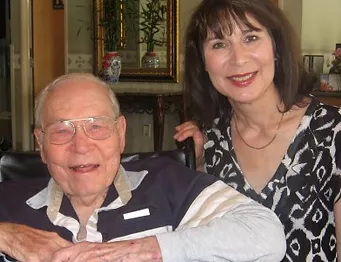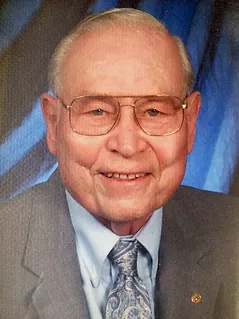Keith Blair Black box drugs without Informed Consent
by daughter, Marian Hollingsworth
My father, Keith Blair, was a retired dentist and widower when he came to live with us (me, my husband, and 4 children). During the three years he lived with us, he was still rather independent and able to take care of all his physical needs such as bathing and dressing. I kept track of his medications, drove him to appointments, and made sure he got three meals a day. At the beginning of the summer of 2009, my father had a routine appointment with his cardiologist, who opined that my Dad was doing well, and could wait another six months before his next appointment.
My father had been experiencing back pain, strong enough to make him gasp when he got out of bed or scooted his chair to the table. His primary care physician suggested that I put my father in the hospital so they could “turn him inside out” to find the source of the pain. In hindsight, something that primary care doctor said was an eerie foreboding. He told me, “Don’t be surprised if he gets confused, because when you put an older person in a different environment, that can happen.” I had shrugged off that statement because my father never had an issue when he went into a medical environment. In the previous couple of years, he had successfully undergone a pacemaker replacement, as well as cataract surgery in both eyes, with no problems whatsoever. However, now I realize that doctor planned to drug my father.
 Dad was admitted to a San Diego hospital on July 10, 2009 to begin tests. Without my knowledge or consent, my father was given Haldol, Risperdal, Ativan, Morphine and Tylenol with Codeine. Haldol and Risperdal are considered black box drugs because they carry a FDA warning not to be given to elderly adults because of the risk of severe side effects or death. The doctor was supposed to obtain informed consent on a special form but deliberately failed to do so. My father experienced a very sudden mental and physical decline. When I asked the doctor and nurses why he was suddenly talking out of his head, I was told it was “hospital delirium” that should go away in a week or so. It was suggested that my dad be sent to a nursing home to get physical therapy for his back and regain his mental stability.
Dad was admitted to a San Diego hospital on July 10, 2009 to begin tests. Without my knowledge or consent, my father was given Haldol, Risperdal, Ativan, Morphine and Tylenol with Codeine. Haldol and Risperdal are considered black box drugs because they carry a FDA warning not to be given to elderly adults because of the risk of severe side effects or death. The doctor was supposed to obtain informed consent on a special form but deliberately failed to do so. My father experienced a very sudden mental and physical decline. When I asked the doctor and nurses why he was suddenly talking out of his head, I was told it was “hospital delirium” that should go away in a week or so. It was suggested that my dad be sent to a nursing home to get physical therapy for his back and regain his mental stability.
At the nursing home, however, Dad was given more Haldol and Risperdal, again without my knowledge or consent. He was also given double doses of Ambien. The nursing home doctor was never there and never returned my calls. My dad started experiencing the classic side effects of Risperdal (the main drug given) such as sudden diabetes, heart problems, low white blood cell count, dehydration, and falls. My father also contracted a MRSA eye infection that spread to his lungs. He was sent to a different hospital after his 7th fall in 12 days.
At that hospital, it was determined that my father was also in kidney and heart failure. The records show he was given Risperdal every day. I was told that the nursing home doctor was out of the country visiting relatives and that her husband would be taking over my father’s care. However, the records show this doctor was indeed in town, and was calling in orders. One of those orders was for Lantus, a diabetic drug that is not recommended for patients over 80 because of “expected cardiac events.” Within a couple hours of being given Lantus, my father was in the Intensive Care Unit with heart failure, and was not expected to survive. Amazingly, he did recover from this incident. But by then the nursing home doctor had slipped into the hospital, documented that my father was not doing well, and falsified a “Do Not Resuscitate” order. My father was then transferred to a hospice, where he died 10 days later, on September 5, 2009.
I had been at the hospital or nursing home every day with my father. I thought I had asked the right questions about my father’s care, but I now know was lied to by at least 4 doctors and multiple nurses. It wasn’t until I obtained the hospital and nursing home records that I realized what they had done to my father. I also discovered they had falsified multiple consent forms for the drugs, in addition to the DNR.
Afterwards, I filed complaints against the nursing home and doctors. The California Department of Public Health levied 5 deficiencies and 1 citation against the nursing home for the drugging, and each hospital also received deficiencies. For these facilities, deficiencies just mean they have to write up a brief care plan but not prove that any changes in care have been made. Because of my father’s case, the CDPH also issued a policy change, an All Facilities Letter (1108), which ordered nursing homes to verify informed consent when patients on antipsychotic drugs are transferred from hospitals. It took the Medical Board of California more than 3 years to discipline the nursing home doctor, but allowed her to plea bargain down to a public letter of reprimand for poor record keeping and giving my father a diabetic medicine unnecessarily.
I now spend considerable time working on patient safety advocacy. I follow the Medical Board of California and have worked with another advocate to compile a list of 450 doctors in California who have been disciplined for sexual misconduct; we also developed another new website of disciplined for other egregious findings. I am on the CDPH Hospital Acquired Infection Advisory Committee, where we work to improve infection rates and educate the public about infections. I also volunteer with the Consumers Union Safe Patient Project. I am excited to be included in the launching of the Patient Safety Action Network. I feel that if I was fooled in my father’s case, other people could be fooled as well. I have spoken to community groups about how to better protect ourselves and our loved ones in hospitals and nursing homes by knowing state and federal laws for informed consent.
The kicker for my father’s story is that the reason for his back pain was spinal stenosis, which could have been treated at home with over-the-counter medications and physical therapy. His premature death was completely preventable.
Finally, I just began a blog, Marian’s Musings, that primarily deals with medical issues to further patient safety.

